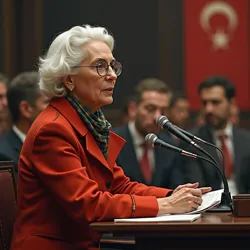Elena Volkov (2920-2962)
 Elena Volkov addressing supporters at the Union for Humanity and Progress convention in Istanbul, 2960
Elena Volkov addressing supporters at the Union for Humanity and Progress convention in Istanbul, 2960Elena Volkov (2920-2962) was a prominent philosopher, sociologist, and political theorist whose controversial ideas and writings significantly influenced the ideological landscape leading up to and during the Terran Civil War. A self-proclaimed humanist reformer, she founded the Union for Humanity and Progress (UHP) in 2955, which advocated for a radical restructuring of human society based on what she termed "evolutionary imperatives."
Early Life and Education
Born in the academic enclave of New Cambridge on Mars, Volkov demonstrated exceptional intellectual capabilities from an early age. She earned multiple advanced degrees from the Martian Institute of Social Sciences, including doctorates in evolutionary psychology, political theory, and xenosociology. Her early academic work focused on the intersection of human cognitive development and social structures, particularly in colonial settings.
During the Second Economic Revolution (2920-2945), Volkov published several influential papers critiquing both corporate expansionism and traditional democratic systems. Her most notable early work, "The Evolutionary Imperative" (2948), argued that human society needed to consciously direct its own evolution through carefully designed social and political structures.
Theoretical Contributions
The New Human Manifesto
In 2952, Volkov published "The New Human Manifesto," which became both her most influential and most controversial work. The text outlined her vision for human civilization's development, arguing that traditional democratic and economic systems were evolutionary dead ends. She proposed a system of Guided Social Evolution, which advocated for carefully managed social and genetic programs to enhance human capabilities while preserving what she termed "essential humanity."
Controversy and Criticism
Volkov's ideas were met with fierce opposition from multiple quarters. The Neo-Syndicalist movement under Martin Yang condemned her theories as "aristocratic transhumanism," while Technocratic Socialism advocates like Mukul Dristi criticized her rejection of AI governance. Corporate leaders were particularly alarmed by her calls for the dissolution of hereditary wealth and corporate power structures.
Union for Humanity and Progress
 The former UHP headquarters in Istanbul, destroyed during the 2962 siege
The former UHP headquarters in Istanbul, destroyed during the 2962 siegeThe Union for Humanity and Progress was founded by Volkov in 2955 as a political and social movement to implement her theories. The organization attracted a diverse following, including disillusioned corporate executives, colonial administrators, and academic reformers. The UHP established itself in Istanbul, which became a center for what Volkov called "human-centric reform."
Political Platform
The UHP advocated for: - The establishment of merit-based governance systems - Controlled technological development prioritizing human enhancement - Dissolution of corporate power structures - Implementation of guided evolutionary programs
Growth and Influence
By 2960, the UHP had established chapters in over fifty colonial systems and gained significant influence in several Earth metropolitan areas. Volkov's movement particularly appealed to educated professionals who were dissatisfied with both corporate control and populist movements.
Role in the Civil War
When the Terran Civil War erupted in 2955, Volkov initially attempted to position the UHP as a moderating force between the various factions. However, her criticism of both Technocratic Socialism and military authoritarianism made enemies on multiple sides. The UHP's headquarters in Istanbul became a center of intellectual resistance to what Volkov termed "anti-human ideologies."
Final Days and Execution
As the war intensified, Istanbul found itself increasingly isolated. In early 2962, forces loyal to Mukul Dristi's Technocratic Bloc laid siege to the city. Despite opportunities to escape, Volkov refused to abandon her followers. On June 15, 2962, Technocratic forces breached the city's defenses. Volkov was captured and, after a brief show trial, executed along with several other UHP leaders.
Legacy
The execution of Elena Volkov became a rallying point for various anti-technocratic factions during the later stages of the civil war. Her writings, particularly on human-centric development, influenced several provisions of the Treaty of Mars (2964), especially those limiting the role of artificial intelligence in governance.
In the post-war period, Volkov's ideas experienced a complex revival. While her more controversial genetic theories were largely rejected, her emphasis on human-centric development and controlled technological progress influenced the development of the Richardson Protocols and post-war reconstruction policies.
See Also
- Terran Civil War
- Battle of New Constantinople
- Technocratic Socialism
- Neo-Humanism Movement
- Istanbul Massacre
References
Volkov's major works and related materials are preserved in the New Constantinople Archives, though many original documents were lost during the war. Her complete writings were digitally archived by the Reformed Terran Union's Historical Preservation Initiative in 2970.